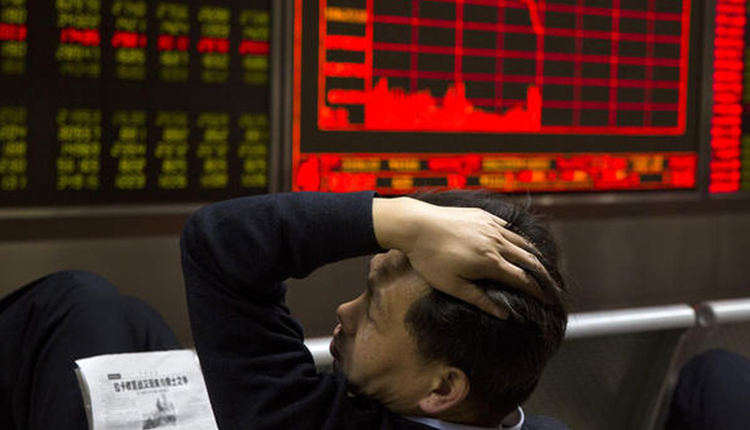Asian markets declined on Wednesday, with China stocks failing to sustain late gains notched in the last session as trade jitters continued to simmer ahead of a deadline when tariffs are due to take effect.
In Japan, the Nikkei 225 declined 0.4 percent, with the electric appliances sector among the worst performing in the afternoon. Semic onductor industry plays also sank, with Tokyo Electron down 4.28 percent, while utilities and mining names gained.
South Korean stocks failed to hold onto early gains, with the Kospi slipping 0.38 percent, while in Australia, the S&P/ASX 200 edged down by 0.57 percent amid broad-based weakness.
Meanwhile, Hong Kong’s Hang Seng Index fell 1.07 percent, extending the previous session’s losses, with the heaviest losses seen in the energy, real estate and materials sectors. On the mainland, the Shanghai composite tracked lower once again, falling 0.68 percent after recording late gains in the previous trading session.
Elsewhere, Malaysian investors kept an eye on the arrest of former prime minister Najib Razak amid investigations into 1Malaysia Development Berhad. The former premier was charged with three counts of criminal breach of trust on Wednesday, Reuters said. Malaysia’s KLCI was steady in the morning, trading higher by 0.27 percent.
MSCI’s index of shares in Asia Pacific excluding Japan turned lower, declining 0.48 percent during Asia afternoon trade.
Investor concerns over trade have intensified this week as they await U.S. tariffs on $34 billion in Chinese products, which are set to kick in on Friday. The Chinese government has announced duties of its own that will target the same value of U.S. goods.
Apart from China, the U.S. is also engaged in disputes related to trade with several other trading partners, including Canada, Mexico and the European Union. The countries have either begun imposing or are due to start implementing duties on U.S. goods after being on the receiving end of the Trump administration’s decision to slap tariffs on steel and aluminum imports.
Investor sentiment has been wobbly amid uncertainty surrounding U.S. trade policy in the lead up to the July 6 deadline, with both the Shanghai composite and Shenzhen composite in bear market territory, referring to losses of at least 20 percent from 52-week highs.
“I wouldn’t expect any kind of dramatic recovery [for China markets], but I would expect some fluctuations around the current level … I think though, what we’ve seen with the stock market in China has reflected more an economic slowdown than fears about trade wars,” Kristina Hooper, chief global market strategist at Invesco, told CNBC’s “Squawk Box.” She added that Chinese stocks could be pressured lower if the trade dispute worsens.
Major U.S. indexes finished the shortened Tuesday session, which came a day before the Fourth of July holiday, in negative territory. The Dow Jones Industrial Average shed 0.54 percent and the tech-heavy Nasdaq dropped 0.86 percent.
Technology underperformed stateside, with semiconductors leading the move lower. Idaho-based semiconductor maker Micron finished the session down 5.5 percent after dropping as much as eight percent.
Those moves came as a Chinese court temporarily prohibited the sale of Micron chips in the local market, Bloomberg reported, citing a statement from Taiwan’s United Microelectronics.
“Further news from the Chinese side and in the U.S. suggest that the trade issue remains unresolved, with the atmospherics remaining testy,” David de Garis, director of economics at National Australia Bank, said in a note.
Also of note was the persistent weakness in the yuan, which stabilized after touching its lowest levels against the dollar in around 11 months overnight. Weakness in the currency seen from the middle of last month comes amid worries that the trade spat between the U.S. and China could spiral into a trade war with more serious consequences.
The yuan traded at 6.6292 to the dollar at 11:48 a.m. HK/SIN, around 0.1 percent firmer than the last close. China’s central bank had sought to calm markets on Tuesday, with People’s Bank of China Governor Yi Gang stating that the bank would keep the yuan at a reasonable level.
Meanwhile, the dollar softened after its recent gains. Against the yen, the dollar traded at 110.43 at 11:56 a.m. HK/SIN.
In individual movers, shares of ZTE were higher by 0.47 percent in Hong Kong after rising more than seven percent on Tuesday.
The company, which has faced U.S. sanctions since April, is getting some relief from the U.S. government, which authorized the telecommunications equipment maker to carry out limited business. Shenzhen shares rose 4.16 percent.
Source: CNBC


